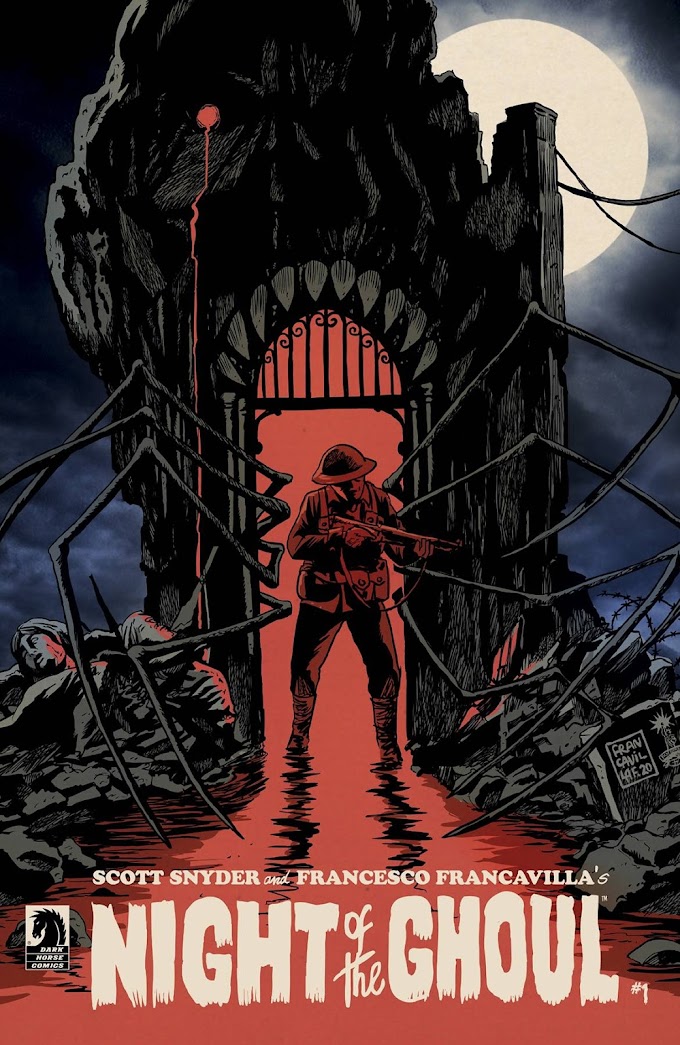For whatever reason, I think 2000AD is criminally under-reviewed, and part of doing this is because it fits squarely with Panel Patter's mission to bring attention to stuff that's damned good but falls under the radar.
So we'll see how this goes. Are you interested in reading a weekly look at 2000AD? I guess we'll find out, eh?
Stories this week:
Judge Dredd: Block Judge Part 2 by John Wagner and Carlos Esquerra
Stickleback: The Thru'Penny Opera Part 2 by Ian Edgington and D'Israeli
Greysuit: Prince of Darkness Part 1 by Pat Mills, John Higgins and Sally Hurst
Ichabod Azrael: One Last Bullet Part 1 by Rob Williams and Michael Dowling
Kingdom: Aux Drift Part 2 by Dan Abnett, Richard Elson, and Abigail Ryder
After giving us a short tour of the upper levels to ensure readers understand just how divided the social classes are in the world of Mega-City 1, Wagner and Ezquerra return to the madness going on in the common areas, as Dredd uses radical judicial therapy to bring things in line. The focus here is squarely on the reactions of the citizens to this new regime, showing that while Dredd is the star, that doesn't necessarily make him the hero. Further, pushing so hard looks like it's not even going to work.
 |
| Art from Judge Dredd |
The opening page of Stickleback's story is even more mind-blowing than in Prog 1900, and that's saying something, as D'Israeli literally winds the story around the horrific "art" of the Cutter. Stickleback is challenged to stop the madman, and goes not to the police, but to the newspaper, because this is Sherlock Holmes era-London, and we all know how good the cops were then. Moving the story along a bit slowly here, Edgington nonetheless gives us some great lines of dialogue, such as when Stickleback is okay with being challenged--but not getting called old.
 |
| Art from Stickleback |
The first of the new stories introduced into the mix, Greysuit, opens with a criminal fearing, then hoping for involvement with the Greysuit organization. It works fine as an introduction, because his monologue can cover exposition, but the plot of this particular entry is pretty predictable from the start, which hurts it. It might have been nice to see Pat Mills give it a twist of some kind. On the art side of things, John Higgins works in a realistic style that reminded me a bit of Brian Bolland (though no one can ever be quite him) but with layers of shadow that are more akin to Sean Phillips. It works well for telling the story of a secret agency that's out to use a programmed man for ill purposes, and I'm hoping that once we settle in, this will scratch my crime comic itch nicely.
I'm afraid the Ichabod Azrael story just left me cold. I'm sure fans of the older material are happy to see this one come to an ending, but jumping in here didn't work. Even understanding it was the last act, I didn't find anything in Williams and Dowling's story compelling enough to get hooked. Raging against God and trying to kill it? Damning everyone in your quest to do so? Just not my thing, and that's okay. I also wasn't a fan of the thin, sparse art from Dowling. Given the idea of going right to where the creator lives, there's a ton of white space, and the lines are so thin I don't think they reproduced very well, dulling their impact. This might just get skipped going forward, but I'll give it one more shot. Not everything in an anthology is going to be for everyone.
 |
| Art from Greyskin |
That's it for Prog 1901. Prog 1902 is out today, and I hope to get to that sooner, so we can be current with Prog 1903 for October 15th. Stay tuned (I hope) as I continue to look at one of the best anthologies out there, and encourage you to to join me.
In fact--if you have something to say about Prog 1901, why not share it in the comments? I'd love to have this become a more extended conversation!






![Sweat and Soap [Ase to Sekken] by Kintetsu Yamada](https://blogger.googleusercontent.com/img/b/R29vZ2xl/AVvXsEgMnQltxjWqGS1_duhCp9Er1a0NbALuSFrqvjaV4_PjN_w67xCGghYt-l0qKyqTH7Ei7gbq_mxVq8aPAuOiyaArwAMLJWhpGmOYaARUBnwvjmv2-ZIe20m_zR5CvKnPdI6US_AuOnmi3gSX/w680/57525895-BA7E-4EF8-9FE4-89F9C164E1A4.jpeg)

